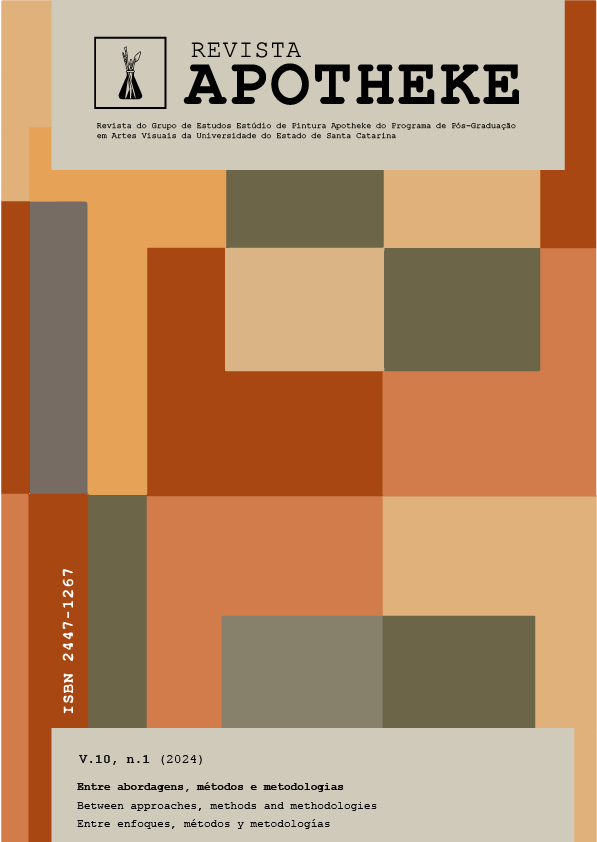Ateliê Público: cenas pedagógicas a céu aberto
DOI:
https://doi.org/10.5965/244712671012024036Palavras-chave:
educação sensível , arte-educação, estética e pedagogia, arte, estéticaResumo
Os procedimentos e processos estéticos que configuram as experiências artísticas são analisados, no presente artigo, a partir da realização do projeto de arte-educação não formal denominado Ateliê Público. Apresentamos sua dinâmica de ação, avaliando a aplicação ampliada de seus métodos para projetos pedagógicos formais, ultrapassando o âmbito de ensino da arte. A reflexão propõe uma análisedas metodologias tradicionais de ensino com a incorporação de princípios estéticos como forma norteadora para apreensão de conteúdos variados e construção de novos saberes. Com argumentação baseada nas concepções filosoficamente distintas dos pensadores Friedrich Schiller (1759-1805) e John Dewey (1859-1952) acerca da experiência sensível e sua relação com a formação humana,buscaremos pontos de convergência que subsidiem nosso propósito de contribuir, aliada a experiência como arte-educadoras,com pressupostos que legitimem a educação para a sensibilidade como fator decisivo na formação integral dos sujeitos escolares.
Downloads
Referências
ALVES, Rubem. Por uma educação romântica. 9.ed. Campinas, SP: Papirus, 2012.
BRASIL. Ministério da Educação. Base Nacional Comum Curricular. Brasília, 2018.
CARVALHO, C.; Souza, M.A.C. (Org.). Arte e estética na educação: pesquisas e processos. Curitiba: Appris, 2019.
CÁSSIO, Fernando. Existe vida fora da BNCC? In: Cássio, F.; Catelli Jr, R. (org.). Educação é a base? 23 educadores discutem a BNCC. São Paulo: Ação educativa, 2019. p.13-39.
DEWEY, John. Arte como experiência. Tradução Vera Ribeiro. São Paulo: Martins Fontes, 2010.
DUARTE JR., João Francisco. O sentido dos sentidos a educação (do) sensível. 5.ed., Curitiba: Criar Edições, 2001.
Observatório da implementação da BNCC e do Novo Ensino Médio. Movimento pela Base – Observatório. © 2022. O novo ensino médio. Disponível em: <https://observatorio.movimentopelabase.org.br/sobre/#quem-somos>. Acesso em: 20 de novembro de 2022.
OSTROWER, Fayga. Universos da arte. 24.ed. Rio de Janeiro: Editora Campus, 1983.
READ, Herbert. A educação pela Arte. Tradução Valter Lellis Siqueira. 2.ed. São Paulo: Editora WMF Martins Fontes, 2013.
SCHILLER, F. A educação estética do homem: numa série de cartas. Tradução de Márcio Suzuki e Roberto Schwarz. São Paulo: Iluminuras, 1990.
UNAMUNO, Miguel de. Amor e pedagogia. Tradução de Lucas Lazzaretti. Rio de Janeiro: Editora 7Letras, 2021.
Downloads
Publicado
Como Citar
Edição
Seção
Licença
Copyright (c) 2024 Débora Andrade, Euzânia Batista Ferreira Andrade

Este trabalho está licenciado sob uma licença Creative Commons Attribution-NonCommercial 4.0 International License.
Os autores de trabalhos submetidos à Revista APOTHEKE autorizam sua publicação em meio físico e eletrônico, unicamente para fins acadêmicos, podendo ser reproduzidos desde que citada a fonte. Os mesmos, atestam sua originalidade, autoria e ineditismo.
Os artigos publicados pela revista são de uso gratuito, destinados a aplicações
acadêmicas e não comerciais. Os direitos autorais são todos cedidos à revista. Os artigos cujos autores são identificados representam a expressão do ponto de vista de seus autores e não a posição oficial da Revista Apotheke. O(s) autor(es) se compromete(m) a sempre que publicar material referente ao artigo publicado na Revista Apotheke mencionar a referida publicação da seguinte forma:
"Este artigo foi publicado originalmente pela revista Apotheke em seu volume (colocar o volume), número (colocar o número) no ano de (colocar o ano) e pode ser acessado em: http://www.revistas.udesc.br/index.php/APOTHEKE/index"
É responsabilidade dos autores a obtenção da permissão por escrito para usar em seus artigos materiais protegidos pela Lei de Direitos Autorais. A revista Apotheke não é responsável por quebras de direitos autorais feitas por seus colaboradores.
Os autores mantêm os direitos autorais e concedem à revista o direito de primeira publicação, com o trabalho licenciado sob Licença Creative Commons do tipo atribuição BY-NC:
Atribuição (BY): os licenciados têm o direito de copiar, distribuir, exibir e executar a obra e fazer trabalhos derivados dela, conquanto que deem créditos devidos ao autor ou licenciador, na maneira especificada por estes.
Uso Não comercial (NC): os licenciados podem copiar, distribuir, exibir e executar a obra e fazer trabalhos derivados dela, desde que sejam para fins não comerciais.
Após a publicação dos artigos, os autores permanecem com os direitos autorais e de republicação do texto.




